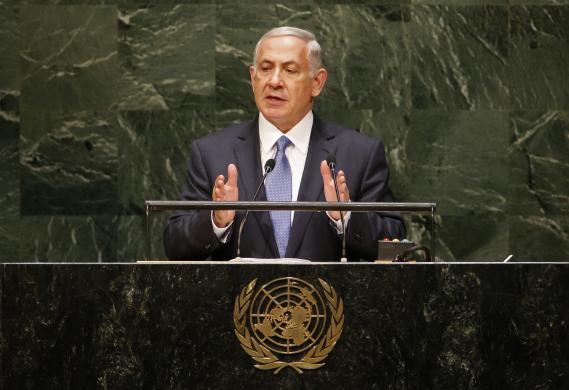 (Reuters) - A nuclear-armed�Iran�would pose a far greater threat to the world than Islamic State militants who have seized large swaths of�Syria�and�Iraq, Israel's Prime Minister Benjamin Netanyahu said on Monday.
(Reuters) - A nuclear-armed�Iran�would pose a far greater threat to the world than Islamic State militants who have seized large swaths of�Syria�and�Iraq, Israel's Prime Minister Benjamin Netanyahu said on Monday."Make no mistake, ISIS (Islamic State) must be defeated," Netanyahu told the�United Nations�General Assembly. "But to defeat ISIS and leave�Iran�as a threshold�nuclear power�is to win the battle and lose the war."
"Iran's nuclear military capabilities must be fully dismantled," Netanyahu said. Netanyahu said that the point of Tehran's recent "charm offensive" toward the West was to get international sanctions lifted "and remove the obstacles to Iran's path to the bomb."
In his speech, Netanyahu appeared to attempt to shift the attention of the West back to Iran after last week's U.N. meetings were dominated by the threat of Islamic State and international efforts to stop the militant group.
Netanyahu twice referred to the "Islamic State of Iran," which would appear to be a deliberate play on the country's official name - the Islamic Republic of Iran - and Islamic State, which is often referred to as ISIL or ISIS.
He also compared Islamist militants in general to Nazis: "Nazis believed in master race, Islamist militants believe in a master faith."
Netanyahu referred mockingly to Iranian President Hassan Rouhani's speech to the 193-nation General Assembly last week, saying the head of the Tehran government "shed crocodile tears" about the threat of Islamic State. Rouhani accused the West and its allies of nurturing the group.
Rouhani said he supported efforts to combat Islamic State, a Sunni militant group that views the predominantly Shi'ite Iran as heretical, though he said it should be handled by the region, not countries outside the Middle East.
Iran and six world powers held 10 days of talks on the sidelines of the annual gathering of world leaders at U.N. headquarters in New York City but made little progress in overcoming deep disagreements on issues such as the future scope of Tehran's nuclear program and the speed of lifting sanctions.
The two sides are expected to meet again in Europe in the next two weeks, Iranian and Western officials say.
Iran rejects Western allegations that it is developing the capability to produce atomic weapons and wants economic sanctions lifted as part of any nuclear deal.
Netanyahu, on the topic of the peace process between Israel and the Palestinians, expressed his support for a "historic compromise" with the Palestinians that would bring peace and stability for the Israeli people and the region. But he offered no new details of what such a compromise would envisage.
An Egyptian-brokered ceasefire in late August ended a 50-day war in the Gaza Strip between Israel and the Palestinian militant group Hamas that controls Gaza. Israel began an offensive on July 8 with the aim of halting cross-border rocket salvoes by Hamas and other militants.
Netanyahu repeated his position that "ISIS and Hamas are branches of the same poisonous tree."
The conflict devastated some Gaza districts and killed more than 2,100 Palestinians, mostly civilians, according to the Gaza health ministry. Sixty-seven Israeli soldiers and six civilians in Israel were also killed.
By Reuters
The Iran Project is not responsible for the content of quoted articles.











